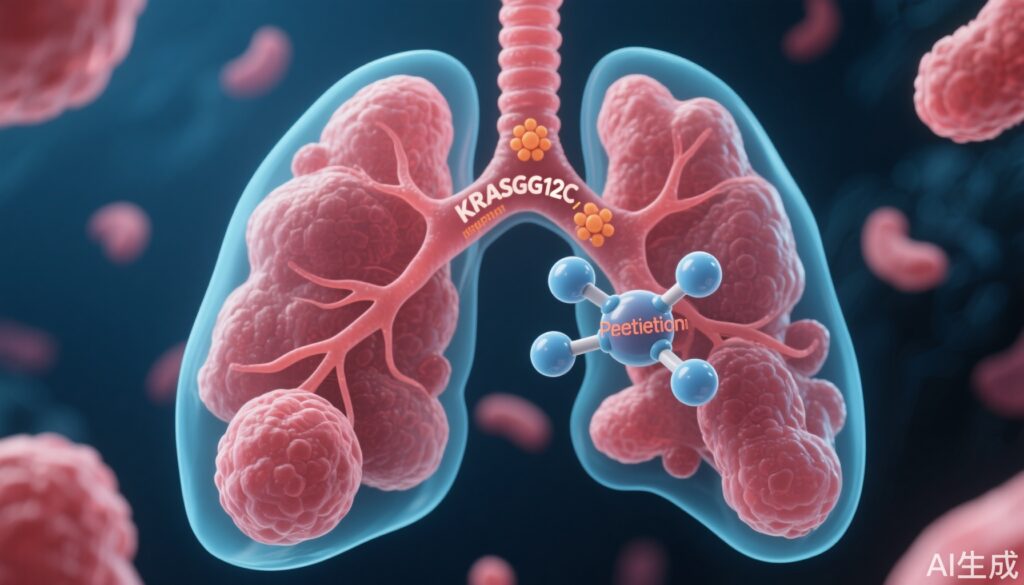Highlight
– Adagrasib, a targeted KRASG12C inhibitor, significantly improves progression-free survival over docetaxel in advanced NSCLC previously treated with chemotherapy and immunotherapy.
– Median progression-free survival (PFS) was 5.5 months for adagrasib versus 3.8 months for docetaxel.
– Grade 3 or higher treatment-related adverse events were comparable between groups, without new safety concerns.
– Findings support adagrasib as an effective second- or third-line therapy option in KRASG12C-mutated NSCLC.
Study background and disease burden
Non-small-cell lung cancer (NSCLC) accounts for approximately 85% of lung cancer diagnoses worldwide and remains a leading cause of cancer mortality. Advances in molecular oncology have identified oncogenic drivers amenable to targeted therapy, but KRAS mutations, especially the KRASG12C variant, have long been considered therapeutically challenging. Recent developments of selective KRASG12C inhibitors have opened new avenues for treatment. Adagrasib is one such inhibitor that showed promising efficacy in phase 2 studies for advanced NSCLC harboring KRASG12C mutations. Despite improvements with chemotherapy and immune checkpoint inhibitors, resistance and disease progression remain common, highlighting an unmet clinical need for effective second-line options in this patient population.
Study design
KRYSTAL-12 is a multicentre, open-label, randomized phase 3 trial conducted across 230 centers in 22 countries. Eligible patients had locally advanced or metastatic NSCLC harboring KRASG12C mutations, who had progressed after prior platinum-based chemotherapy and PD-1 or PD-L1 inhibitor treatment. Patients were randomized 2:1 to oral adagrasib 600 mg twice daily or intravenous docetaxel 75 mg/m2 every 3 weeks. Randomization was stratified by geographical region (non-Asia-Pacific vs. Asia-Pacific) and prior treatment sequencing (sequential vs. concurrent chemotherapy and immunotherapy). The primary endpoint was progression-free survival (PFS) assessed by blinded independent central review in the intention-to-treat population. Secondary endpoints included overall survival, objective response rates, and safety evaluation.
Key findings
Between February 2021 and November 2023, 453 patients were randomized: 301 to adagrasib and 152 to docetaxel. The median follow-up period was 7.2 months. Median PFS was significantly longer with adagrasib at 5.5 months (95% CI 4.5-6.7) compared to 3.8 months (95% CI 2.7-4.7) for docetaxel, with a hazard ratio of 0.58 (95% CI 0.45-0.76; p<0.0001). This represents a 42% reduction in the risk of progression or death.
Treatment-related Grade 3 or higher adverse events occurred in 47% of patients receiving adagrasib versus 46% for docetaxel, indicating similar tolerability profiles. Treatment-related deaths were rare, with four (1%) in the adagrasib group and one (1%) in the docetaxel arm. Common toxicities for adagrasib included gastrointestinal events, whereas hematologic toxicities predominated in the docetaxel arm.
These results affirm the efficacy of adagrasib with a manageable safety profile, significantly improving PFS over the current standard chemotherapy in this heavily pretreated population.
Expert Commentary
The KRYSTAL-12 trial is a pivotal study validating KRASG12C as an actionable driver mutation in advanced NSCLC. Adagrasib’s oral administration and targeted mechanism represent a paradigm shift from conventional chemotherapy. The trial’s rigorous design, including stratification factors and blinded independent review, strengthen the validity of the PFS benefit observed.
However, the median follow-up time remains relatively short for overall survival assessment, warranting ongoing evaluation. Additionally, understanding mechanisms of resistance to adagrasib and exploring combination strategies may further enhance outcomes. The comparable toxicity profiles highlight the feasibility of incorporating adagrasib into clinical practice without new safety concerns.
Guidelines are anticipated to integrate KRASG12C inhibitors as standard care following prior platinum and immunotherapy, emphasizing molecular testing as critical for personalized treatment planning.
Conclusion
Adagrasib significantly improves progression-free survival in patients with KRASG12C-mutated advanced NSCLC compared to docetaxel, with no new safety signals identified. This trial supports adagrasib as a valuable treatment option post-chemotherapy and immune checkpoint inhibitor failure, addressing a significant unmet need in this molecularly defined subset of lung cancer patients. Future research should focus on long-term outcomes, resistance mechanisms, and optimal sequencing or combinations of targeted therapies to maximize patient benefit.
References
Barlesi F, Yao W, Duruisseaux M, et al; KRYSTAL-12 Investigators. Adagrasib versus docetaxel in KRASG12C-mutated non-small-cell lung cancer (KRYSTAL-12): a randomised, open-label, phase 3 trial. Lancet. 2025 Aug 9;406(10503):615-626. doi: 10.1016/S0140-6736(25)00866-9. PMID: 40783289.


